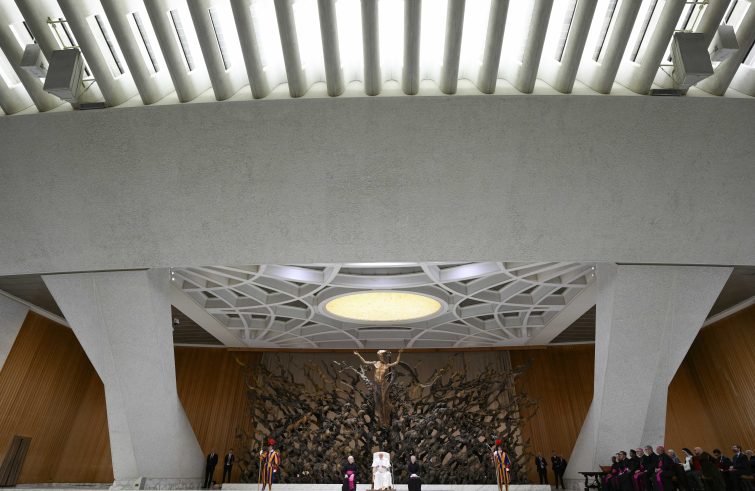
“Next Saturday, 27 January, marks the International Day of Commemoration in memory of victims of the Holocaust”, Pope Francis said in his closing greetings to the Italian faithful gathered in Paul VI Hall for the Wednesday general audience. “May the remembrance and condemnation of that horrible extermination of millions of Jewish people and those of other faiths, which occurred in the first half of the last century, help us all not to forget that the logic of hatred and violence can never be justified, because they negate our very humanity”, the Pope’s appeal: “War itself is a negation of humanity. Let us not tire of praying for peace, for an end to conflicts, for a halt to weapons and for relief for stricken populations. I am thinking of the Middle East, of Palestine, of Israel, I am thinking of the disturbing news coming from tormented Ukraine, especially the bombings that hit places frequented by civilians, sowing death, destruction and suffering. I pray for the victims and their loved ones, and I implore everyone, especially those with political responsibility,
to protect human life by putting an end to wars.
Let us not forget: war is always a defeat, always. The only ‘winners’ – in inverted commas – are the arms manufacturers.”
Avarice “is a sickness of the heart, not of the wallet”,
the Pope said in the opening lines of the catechesis dedicated to “that form of attachment to money that keeps man from generosity.” Avarice, Francis explained, “is not a sin that regards only people with large assets, but rather a transversal vice, which often has nothing to do with the bank balance.” “The desert fathers’ analysis of this evil showed how avarice could even take hold of monks, who, after renouncing enormous inheritances, in the solitude of their cell clung to objects of little value: they would not lend them, they did not share them and were even less willing to give them away”, the example chosen by the Pope: “An attachment to little things. Those objects became for them a sort of fetish from which they could not detach themselves. A sort of regression to the state of children who clutch their toy repeating, “It’s mine! It’s mine!”.
An attachment to little things, which takes away freedom. In this claim there lurks a disordered relationship with reality, which can result in forms of compulsive hoarding and pathological accumulation.
To heal from this sickness, the monks proposed a drastic, though highly effective method: meditation on death.”
“However much a person accumulates goods in this world, of one thing we can be absolutely sure: they will not enter the coffin with us.” Thus the Pope revealed the “senselessness” of the vice of avarice. “We cannot take property with us!”, he added in unscripted remarks: “The bond of possession we create with objects is only apparent, because we are not the masters of the world: this earth that we love is in truth not ours, and we move about it like strangers and pilgrims.” “These simple considerations allow us to realize the folly of avarice, but also its innermost reason”, Francis remarked: “It is an attempt to exorcise the fear of death: it seeks securities that in reality crumble the very moment we hold them in our hand.” “We may be the masters of the goods we possess, but often the opposite happens: they eventually take possession of us”, the Pope said, for
“Some rich men are no longer free, they no longer even have the time to rest, they have to look over their shoulder because the accumulation of goods also demands their safekeeping. They are always anxious, because a patrimony is built with a great deal of sweat, but can disappear in a moment.
They forget the Gospel preaching, which does not claim that riches in themselves are a sin, but they are certainly a liability.” “God is not poor: He is the Lord of everything, but, as Saint Paul writes, ‘Though He was rich, yet for your sake He became poor, so that by His poverty you might become rich’”, Francis pointed out: “This is what the miser does not understand. He could have been a source of blessing to many, but instead he has slipped into the blind alley of wretchedness.”
“And the life of the miser is ugly”,
Francis concluded the catechesis with an anecdote from his time as bishop of Buenos Aires. He said: “I remember a case of a man who I met in the other diocese, a very rich man, and his mother was sick. He was married. The brothers took turns to care for the mother, and the mother had a yoghurt in the morning. This man gave her half in the morning so as to give her the other half in the afternoon, and to save half the yoghurt. This is avarice, this is attachment to things. Then this man died, and the comments of the people who went to the vigil were: ‘But, you can see that this man has nothing on him, he left everything.’ And then, making a bit of a mockery, they would say: ‘No, no, they couldn’t close the coffin because he wanted to take everything with him’”. “In the end we must give our body and soul to the Lord and we must leave everything”, the Pope continued his off text remarks: “Let us be careful! And let us be generous, generous with everyone and generous with those who need us most.”












